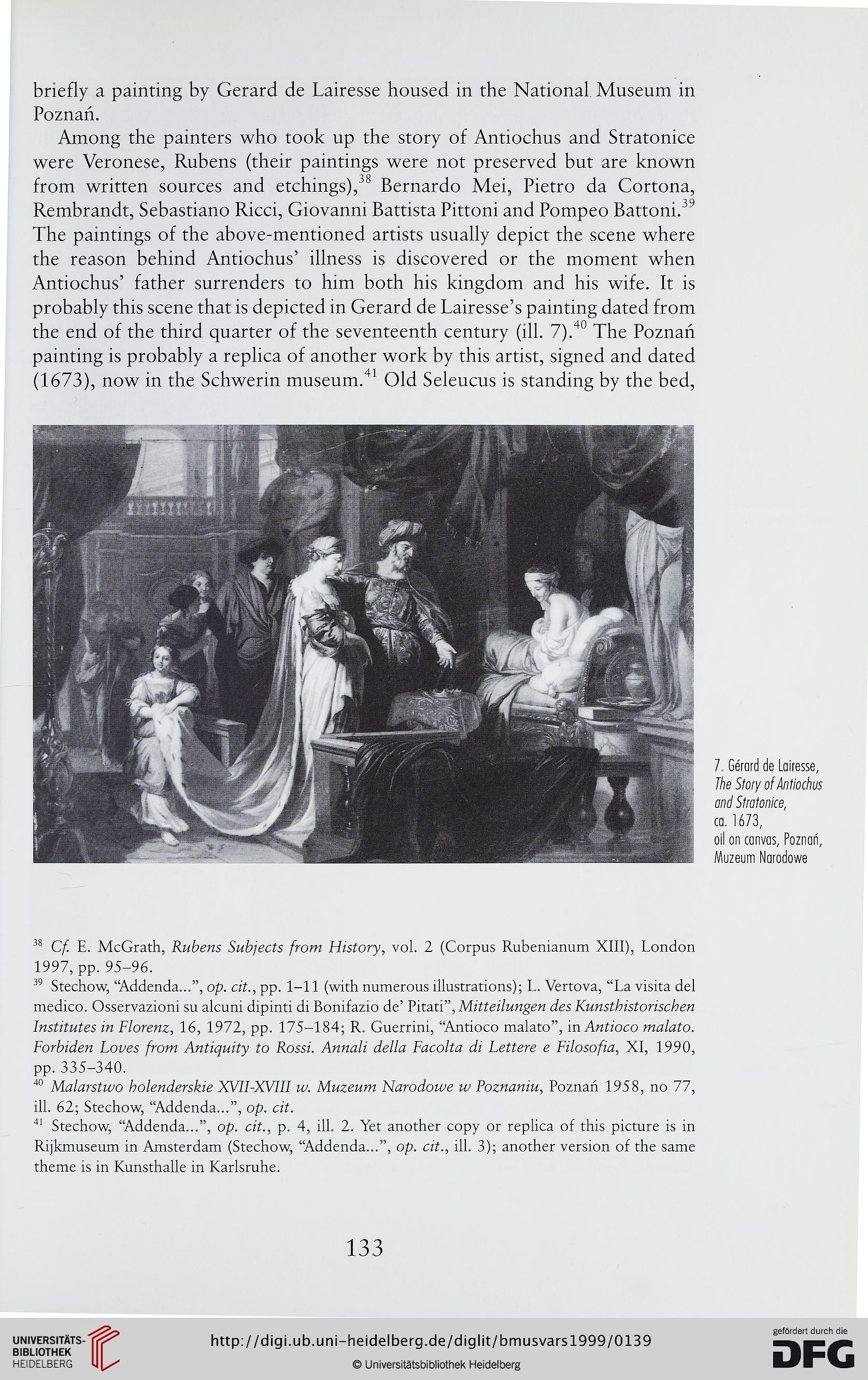briefly a painting by Gerard de Lairesse housed in the National Museum in
Poznań.
Among the painters who took up the story of Antiochus and Stratonice
were Veronese, Rubens (their paintings were not preserved but are known
from written sources and etchings),18 Bernardo Mei, Piętro da Cortona,
Rembrandt, Sebastiano Ricci, Giovanni Battista Pittoni and Pompeo Battoni.38 39
The paintings of the above-mentioned artists usually depict the scene where
the reason behind Antiochus’ illness is discovered or the moment when
Antiochus’ father surrenders to him both his kingdom and his wife. It is
probably this scene that is depicted in Gerard de Lairesse’s painting dated from
the end of the third ąuarter of the seventeenth century (ill. 7).40 The Poznań
painting is probably a replica of another work by this artist, signed and dated
(1673), now in the Schwerin museum.41 Old Seleucus is standing by the bed,
7. Gerard de Lairesse,
The Story of Antiochus
and Stratonice,
ca. 1673,
oil on canvas, Poznań,
Muzeum Narodowe
38 Cf. E. McGrath, Rubens Subjects from History, vol. 2 (Corpus Rubenianum XIII), London
1997, pp. 95-96.
39 Stechow, “Addenda...”, op. cit., pp. 1-11 (with numerous illustrations); L. Vertova, “La visita del
medico. Osservazioni su alcuni dipinti di Bonifazio de’ Pitati”, Mitteilungen des Kunsthistorischen
Institutes in Florenz, 16, 1972, pp. 175-184; R. Guerrini, “Antioco malato”, in Antioco malato.
Forbiden Loves from Antiąuity to Rossi. Annali della Facolta di Lettere e Filosofia, XI, 1990,
pp.335-340.
40 Malarstwo holenderskie XVIFXVIII w. Muzeum Narodowe w Poznaniu, Poznań 1958, no 77,
ill. 62; Stechow, “Addenda...”, op. cit.
41 Stechow, “Addenda...”, op. cit., p. 4, ill. 2. Yet another copy or replica of this picture is in
Rijkmuseum in Amsterdam (Stechow, “Addenda...”, op. cit., ill. 3); another version of the same
theme is in Kunsthalle in Karlsruhe.
133
Poznań.
Among the painters who took up the story of Antiochus and Stratonice
were Veronese, Rubens (their paintings were not preserved but are known
from written sources and etchings),18 Bernardo Mei, Piętro da Cortona,
Rembrandt, Sebastiano Ricci, Giovanni Battista Pittoni and Pompeo Battoni.38 39
The paintings of the above-mentioned artists usually depict the scene where
the reason behind Antiochus’ illness is discovered or the moment when
Antiochus’ father surrenders to him both his kingdom and his wife. It is
probably this scene that is depicted in Gerard de Lairesse’s painting dated from
the end of the third ąuarter of the seventeenth century (ill. 7).40 The Poznań
painting is probably a replica of another work by this artist, signed and dated
(1673), now in the Schwerin museum.41 Old Seleucus is standing by the bed,
7. Gerard de Lairesse,
The Story of Antiochus
and Stratonice,
ca. 1673,
oil on canvas, Poznań,
Muzeum Narodowe
38 Cf. E. McGrath, Rubens Subjects from History, vol. 2 (Corpus Rubenianum XIII), London
1997, pp. 95-96.
39 Stechow, “Addenda...”, op. cit., pp. 1-11 (with numerous illustrations); L. Vertova, “La visita del
medico. Osservazioni su alcuni dipinti di Bonifazio de’ Pitati”, Mitteilungen des Kunsthistorischen
Institutes in Florenz, 16, 1972, pp. 175-184; R. Guerrini, “Antioco malato”, in Antioco malato.
Forbiden Loves from Antiąuity to Rossi. Annali della Facolta di Lettere e Filosofia, XI, 1990,
pp.335-340.
40 Malarstwo holenderskie XVIFXVIII w. Muzeum Narodowe w Poznaniu, Poznań 1958, no 77,
ill. 62; Stechow, “Addenda...”, op. cit.
41 Stechow, “Addenda...”, op. cit., p. 4, ill. 2. Yet another copy or replica of this picture is in
Rijkmuseum in Amsterdam (Stechow, “Addenda...”, op. cit., ill. 3); another version of the same
theme is in Kunsthalle in Karlsruhe.
133




